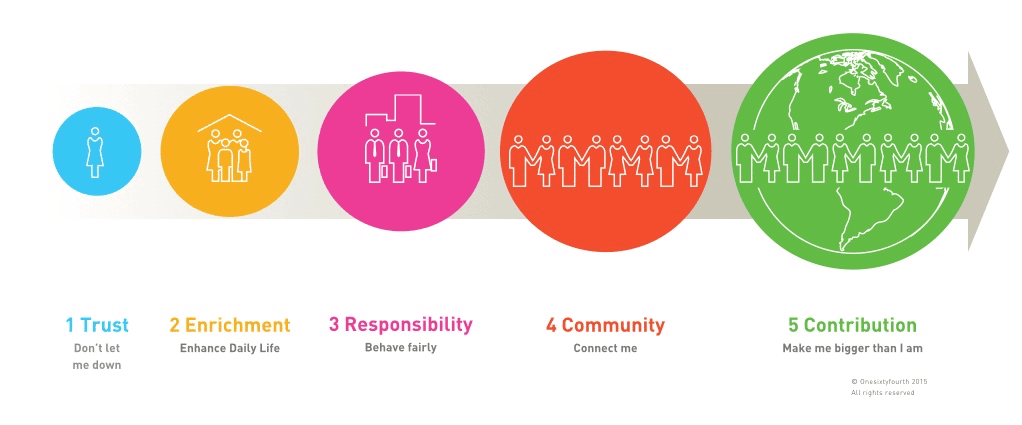The two go hand-in-hand
As much as those at the helm of a good number of old-school organizations may want it to go away, the trend of choosing products and services based not only on price point or features, but also on how much you like and agree with the behavior of the brand behind it is here to stay. Although the subject of brand reputation as a whole is quite complex, distilling it down to some core tenets is not as difficult as you might imagine.
When we saw this visualization of what the branding experts at OneSixtyFourth call the “Brand Citizenship Model” we immediately drew parallels to what we do in the realm of reputation and crisis management:
Trust is an obvious one. As Chipotle is finding out, when trust goes *poof* it hits you hard in terms of both monetary loss and reputation. Enrichment is one you may think applies only to those pushing product, but consider what your brand can do to enhance the daily life of your stakeholders. After all, isn’t helping at a community event or sharing valuable information via blogs and social media a way to add enrichment? And, of course, being there when they need you to offer your services is part of that as well.
If we have to explain responsibility you’ve likely already clicked away from this article. In short, if you’re not behaving ethically and responsibly it will come to light eventually. Just ask Volkswagen.
Businesses being a part of their community has taken on a whole new meaning since the rise of social media. Sure, before you may have sponsored a couple of local events or handed down your old computers to local schools, but with the internet removing borders and barriers, brands are now able to form communities of like-minded folk that span the globe.
Finally, contribution. Those purchasing your products or using your services want to feel they’re part of the bigger picture, and that means knowing that some portion of their spend is helping to improve the world as a whole. Of course they’re not deciding what you spend some fraction of your income doing, but it does pay to show stakeholders what you’re all about beyond sustaining an income.
The reputation threats we see most commonly arise from failing at one or more of these items. Some are obvious, like a product failure that leads to lack of trust. Others, such as a community that turns sour thanks to unmitigated rumor and innuendo, are not so apparent until they’re creating difficulties.
One of our crisis management constants is preaching that you prevent the threats you can, because there are plenty that will blindside you. By making your brand a model citizen in our global society you eliminate many potential issues, leaving you free to cope with those you can’t avoid.
The BCM Blogging Team
www.bernsteincrisismanagement.com


Comments 1
Great insight, very informative article.